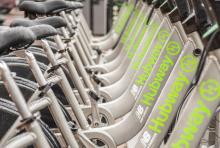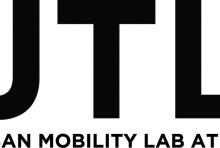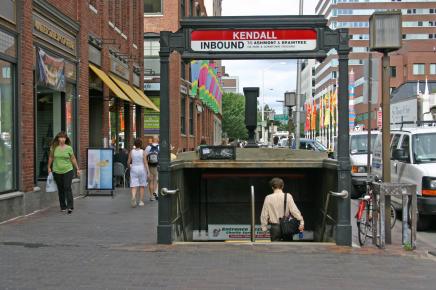Access MIT represents the Institute’s progressive vision for rethinking the culture of commuting and encouraging sustainable transportation practices. Access MIT provides benefits to employees that choose active, sustainable modes of commuting.

How we move from place to place efficiently and responsibly is one of humankind’s most enduring challenges. At MITOS, we are working with our operational and research partners to provide students, staff, and faculty with ample opportunities to choose low-impact modes of transportation that are also flexible and affordable. As a key component of that goal, we’re working with the Parking & Transportation Office and the MIT Transit Lab to deliver a landmark commuting initiative called Access MIT, which provides the MIT community with flexible, affordable, and low-carbon commuting choices, while reducing the demand for parking.
A flexible, interconnected urban mobility system
We’re also working with municipal partners to promote bike, pedestrian, and ride-sharing, streamline public transit, and foster healthy and connected neighborhoods. As we provide our community with diverse, low-carbon modes of transportation, we hope that fewer members will be inclined to commute by car, reducing emissions and congestion, and improving quality of life for all.
Learn about employee commuting benefits.
Strategies
Here are just a few of the mobility strategies we’re advancing:
-
expand the use of alternative fuels in MIT vehicles, optimize vehicle sizes, and improve transit routes and scheduling. MIT campus shuttles currently use a biodiesel fuel blend as called for in contracting criteria.
-
research and apply greenhouse gas management strategies and data collections to MIT’s transportation practices
-
advance an integrated transit system that encourages the use of public transportation, ride sharing, and non-motorized transport
-
promote active modes of commuting, such as walking and biking
-
optimize the connectivity among different modes of transport—hubway, subway, shuttles, walking, and bike paths
-
promote the use of low-emission and zero-emission vehicles
-
collaborate with local cities and towns, the private sector, and social organizations on infrastructure improvements, shared solutions, and public awareness
MITOS Vision for Mobility and Transportation
To develop a campus that is connected inside and out by a smart mobility system that provides access to affordable, flexible, and low-carbon options for the entire MIT community.
MITOS is currently working collaboratively to transform the campus mobility via operations, education, research, and innovation in the following areas.
MITOS continues to gather a preliminary picture of MIT’s Scope 3, or indirect, greenhouse gas (GHG) emissions in order to inform MIT’s total GHG emissions activities (Scopes 1 + 2 + 3) and explore where strategic opportunities may exist to reduce emissions.
MITOS is part of a community of departments, labs, and centers working toward elements of a sustainable campus. Featured below are initiatives from some of our partners.

“ The central premise of the MIT Transit Program is that investment in intellectual capital is as important as investment in the physical infrastructure.”
Fred Salvucci, MIT Research Associate and Former Secretary of Transportation for Massachusetts

Fuses behavioral science and transportation technology to shape travel behavior, design mobility systems, and improve transportation policies.

A research initiative that focuses on collaborative approaches, leveraging various analog and digital data collection and analysis tools, to mobilize a collective intelligence towards improved mobility conditions in a range of contexts around the world.

A project of City Science, Mobility on Demand conceptualizes, prototypes, and pilots mobility interventions.
Running the Commuter Connections and AccessMIT programs, the Parking and Transportation Office is a lead partner in reimagining what mobility can mean on campus.
The MIT Transit Lab has been an essential partner in applying research and testing of new approaches for enhancing more sustainable mobility options on and around campus.
MIT Medical and the getfit@MIT program are important partners in helping to envision campus mobility strategies that embrace our health and wellness dimensions.
The Atlas Service Center provides services including the administration of Commuting benefits (T-pass, parking, and other options). If you are an MIT employee, make sure you have an MBTA Charlie Card chip embedded in your MIT ID. Visit the Service Center to find out about your benefits as a student, staff, or faculty member.




